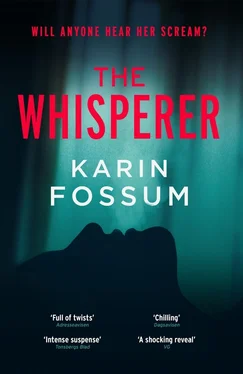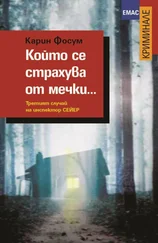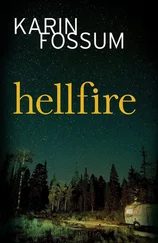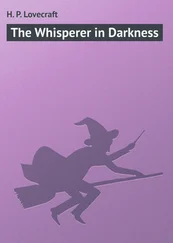She felt the wind on her face as soon as she got off the bus and hurried towards the house. Olaf and Dolly came walking towards her in their high-viz jackets. She had been busy concentrating on her own steps as usual, and so lost count.
‘Have you met them?’ he asked, and nodded to the Sois’ house.
‘No, but I’m sure you have.’
He most certainly had, both the parents and children, and they were incredibly nice, he told her. Friendly and smiling, as Thai people so often are. It’s like the sun comes out as soon as they open their mouths.
‘Did you go to the house?’ Ragna asked.
‘Yes, but I only went into the hall. We stood there for a long time chatting. I did get a peek inside though and there was a lot of exotic furniture.’
‘And the massage table, any sight of that?’
He grinned.
‘Standing ready in the basement. And I for one will be lying on that table before Christmas. My back is so stiff,’ he complained, twisting with exaggerated pain. ‘Maybe she does other treatments too,’ he added. She had never seen that expression in his eyes before. His words made her uncertain. He was not that sort of man, but he did not give her his usual warm smile, as he so often did when he made a joke. Instead he looked thoughtful, as though he was planning something, or had just had a good idea.
He commented on the dark, and the wind. He looked enormous in his down jacket, knitted hat and thick gloves, but she knew he was not.
‘Today’s rubbish hasn’t come yet,’ he said, nodding at her mailbox.
‘What?’ she whispered. ‘Today’s rubbish?’
‘The newspaper,’ he explained. ‘I called them. No one in Kirkelina has got a newspaper today, and they had all kinds of excuses. Sickness, cars breaking down, and I don’t know what else.’
‘I won’t be able to read the births, weddings and deaths then,’ Ragna moaned, looking at him intently.
If it was Olaf who had sent the messages about her death, she wanted to see it in his eyes, some sort of spark, like when iron strikes iron.
‘We’ll have to be happy for those who are famous enough to get on the news when they die,’ he said. ‘I certainly won’t, that’s for sure.’
‘Nor me,’ she whispered back.
They smiled to each other like good neighbours.
Ragna opened the mailbox and peered in. No newspaper, as Olaf had told her, only a white envelope at the bottom. RIEGEL. She stood there with it in her hand as Olaf and Dolly disappeared into the dark. She withered, felt weak. The envelope slipped out of her hand and fell to the ground. She put her foot on it, muddied the white paper. When she looked over her shoulder as she picked it up again, she saw Olaf’s and Dolly’s yellow jackets shining in the headlights of a passing car. She hurried up to the house and let herself in, closing the door forcefully behind her before placing the letter on the kitchen table. Every time I open an envelope, she thought, he wins. She took off her coat and pulled off her boots, ignoring the letter. There was not much in the fridge when she opened it and had a look, but she had taken her coat off now, and could not be bothered to put everything on again to go across to Irfan. She had a box of eggs and decided to make an omelette. The letter could wait. It could just lie there in the meantime, until it lost all its power. She had more important things to do. She was going to have some food, find her son, send a friendly note to his new address. And then she would make a decision: whether she would deign to open letter number three, or tear it to shreds and flush it down the toilet, so the anonymous threat ended up in the sewers where it belonged, and became rat fodder.
She whisked the eggs vigorously, hitting the glass bowl with a fury, then poured the mixture into the frying pan and watched it bubble. Instead of sitting at the kitchen table as she usually did, she went into the sitting room and sat down. When she had shovelled down the simple food, she moved to the computer and searched for international directory enquiries. Rikard Josef Riegel, Berlin. Not many people would have that name, not even in a major city. To her dismay, she immediately received the message Kein Treffer gefunden . She stared at the screen, perplexed. There was another message underneath: Riegel 35 hits. But not Rikard Josef. He may of course have moved away, to the hotel in Johannesburg, like in her daydream. She decided to try again with his address in Landsberger Allee and this time found his name straight away, as though nothing was wrong. She struggled to understand; either he lived there or he did not. But the letter had been returned. He must have moved very recently, in which case the new address might not be registered yet. Or the post office in Berlin had made a mistake, or directory enquiries had made a mistake. They did make mistakes now and then. The larger the city, the more mistakes. Perhaps she should send a new letter to the old address, just to be sure — it might be a one-off mistake. She started to search for a mobile telephone number. But did not find that either. He must have an ex-directory number, for reasons she knew nothing about. She sat there for a long time, thinking. Then she remembered the envelope on the kitchen table. She might as well get it over and done with. Maybe he had planned something and she needed to be prepared. I’m nothing more than a slave, she thought. She went into the kitchen, grabbed the envelope and tore it open.
‘I’M WATCHING YOU.’
‘I tried to work out whether this threat was worse than the last one or not,’ Ragna explained. ‘And decided that it wasn’t.’
‘Why was it not worse?’
‘I had expected a date. That I would die next week. Or even that night, or the next morning. But instead, it was something else. I already knew that he was watching me, I had felt it since I got the first letter. That he was following my every step. I allowed myself a derisive smile. He was already starting to repeat himself, so I relaxed. Not when I was outside, then I kept my eyes peeled, but I was not as afraid any more when I opened the mailbox. Lots of people live with anxiety and distress. So I could live with a fool who was nothing more than a big mouth.’
‘Did you dream about catching him? With the mailbox open and a letter in his hand?’
‘Sometimes,’ she admitted.
‘What would you have said?’
‘The only thing I was prepared to offer was a simple question. Goodness, I would say, so you can actually reach the mailbox without standing on a stool?’
She smiled and looked pleased with herself.
‘Either way, I came to accept that I just had to live with it. Everyone has something. What is it that you have to live with?’
‘Oh, so many things,’ Sejer said. ‘Goes with the job. Everything we see and experience in the course of our work. I can’t just blink my eyes and it’s gone, certainly not the worst things.’
‘And what’s that?’
‘Small children. When there’s nothing left of them after the adults are done. But we must be allowed to dwell on things, it’s a human right,’ he added. ‘I often do.’
He scribbled something on his notepad. Even if she leaned forward, she would not be able to read it. Maybe he was a smoker, maybe the pen was a kind of substitute for a cigarette.
‘We’ve found your son,’ he said suddenly, and looked up.
‘What?’
She sat there open-mouthed. She could not help it.
‘There’s a reason why your letters were returned. He had moved, some time ago.’
‘What did he say?’
‘He didn’t want to talk to us.’
‘But you said that you found him?’
A red light flashed on his telephone. He pushed the notepad to one side and looked at her earnestly, like a priest who comes to the door, Ragna thought, and steeled herself.
Читать дальше












